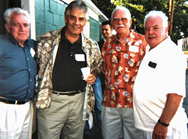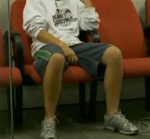That Stonewall was a milestone in the beginning of the fight by homosexuals for their rights, everyone already knows. That thousands of gays were beaten, arrested or humiliated, we also don't know that. It doesn't matter where the information comes from: from a veteran, historian or gay activist. It is a fact that when we talk about the subject, views are almost always the same. And the stories repeat themselves. Few, however, bothered to know the version of those who had actually started the whole mess: the police. Ironically, like a spell turned against witchcraft, they began what might be called the "Modern Homosexual Movement." In advance, we just have to thank them.
The site The Cape he tried, unfortunately unsuccessfully for a few months, to contact a police officer by email. Lack of time, patience or shame in talking? We don't know the reason for the silence. It could have just been a glitch in the system, who knows. Even so, in order not to let it go unnoticed, we selected two articles in which some of these agents present their versions of the 69 rebellion. Both were published in 2004, when the uprising celebrated its thirty-fifth anniversary, in two New York newspapers: "Southern Voice" and "The Villager". The first brings the version of the police officers from the sixth district, responsible for patrolling the Village. They were accused of collusion with the mafiosos who owned the bars. The second tells the story of Seymour Pine, delegate from the First Division, who allegedly carried out the raid without the consent of his colleagues from the Sixth District. The result of this confusion, fortunately, we already know what happened…
The Sixth District version
The Southern Voice newspaper, on 25/06/04, interviewed two police officers – Frank Toscano (in the photo, second from left to right) and Tommy Noble. They would have been the first to arrive at Stonewall, on the morning of June 28th. According to the report, an anonymous caller reported a disturbance at the place – generally caused by a straight man who entered the bar by mistake. Toscano says the police had good relations with gays. "Of course there were also police officers who hated them and vice versa," said Toscano, revealing that many officers frequented bars on their days off, because "the bosses would never look for them in those places."
When they arrived at the location, however, everything was in order. They left and, minutes later, another call: this time a police officer had been stabbed in the Stonewall bathroom. Returning there, they found nothing again. Toscano then suspected it was a prank call and alerted the bartender. It was at that moment that plainclothes officers entered, announcing the raid. "I always thought they made prank calls," said Toscano, referring to First Division agents. According to speculation, they would have been embarrassed to ask for reinforcements from another district. Toscano claims that the agents from the First Division, responsible for the raids (and not their colleagues from the Sixth District), were the ones who had problems. "The gays never wanted trouble, they just wanted us to get out of there."
 What was supposed to be another crash, however, took on unprecedented proportions. Frank Toscano was in the bar's hallway when a customer approached, calling a police officer a "latent homosexual", which for obvious reasons didn't go down well. "It was this short man, shirtless and wearing a leather jacket who started the riot and not a drag act. He ran screaming that the police were killing people. Another man did the same," he reveals. Minutes later, a bottle reportedly flew towards the bar door. Toscano saw the crowd gathering outside and radioed for reinforcements. He denies that protesters tried to burn down the bar. "The real story of the riot came after it. The police were forced to understand about gay issues." Toscano highlights that today he is proud of those who fought. "I like those who fight for their rights. It was the first time I saw gays fight", concludes the police officer, who intends to turn the story into a film script, with the provisional name "RMP 2499" – the number of the vehicle he drove on the day of the rebellion.
What was supposed to be another crash, however, took on unprecedented proportions. Frank Toscano was in the bar's hallway when a customer approached, calling a police officer a "latent homosexual", which for obvious reasons didn't go down well. "It was this short man, shirtless and wearing a leather jacket who started the riot and not a drag act. He ran screaming that the police were killing people. Another man did the same," he reveals. Minutes later, a bottle reportedly flew towards the bar door. Toscano saw the crowd gathering outside and radioed for reinforcements. He denies that protesters tried to burn down the bar. "The real story of the riot came after it. The police were forced to understand about gay issues." Toscano highlights that today he is proud of those who fought. "I like those who fight for their rights. It was the first time I saw gays fight", concludes the police officer, who intends to turn the story into a film script, with the provisional name "RMP 2499" – the number of the vehicle he drove on the day of the rebellion.
The First Division version
The newspaper The Villager, on 16/06/04, published statements by Seymour Pine, then 84 years old, former delegate of the First Division. The statements were made during the launch of the book "Stonewall: the riots that sparked the gay revolution", by David Carter, at the New York Historical Society. Pine, retired since 1976, admitted that police were biased toward gays. "They were certainly harmed, but no one had any idea what it was like to be gay," he said. According to the former police chief, there were at least two reasons for the raids carried out by his unit: the fact that the bars were owned by mafia members and the need to fill out statistics on incidents related to arrests at any cost. "Gays were easy prey, they didn't cause any problems", he explained.
At the time of the rebellion, the Sixth District police received tips from the mafia, which was reportedly involved in business as far away as Europe. Agents believed that bars like Stonewall, which opened late, encouraged illicit schemes. "If we closed these bars, we could see what would happen to other places behind the scheme," Pine said. He claims that several limousines parked outside the bar on Saturday nights. "We had nothing to do with those people and we never raided them there," he admitted. According to David Carter, the owner of the bar was actually a mobster, Fat Tony.
"When the disturbance began, there were two agents dressed as lesbians and two police officers in plainclothes. They said who was selling drugs or promoting illicit activities," said Pine, who was waiting on the other side of the square with Detective Charles Smythe for an indication of the agents to start the crash. To the surprise of the then police chief, however, no sign of the agents was given. "I started to think they were in trouble or had forgotten what was agreed."
The police then invaded the bar, breaking down the door looking for minors. They expected the gays to calmly line up as usual. But the reaction was different. "When we went in, they didn't want to leave." David Carter explains that rumors that police were beating up young people in the bar caused gay men to rally outside. That's when they started throwing nails, coins and dangerous objects – like a parking meter, which was used to break down the door. "The police officers were scared. My fear was that they would lose their cool. If someone had pulled the trigger, we would have been dead. They threw a Molotov cocktail, but we put it out", he said. Still according to Pine, an officer planned to escape through a vent in the roof, to get to the Fire Department, where there was a police radio.
Reinforcement, however, took longer than usual. Pine believes the Sixth District was taking revenge. "They weren't effective in keeping these bars properly controlled. We didn't warn them about the raid, hence the revenge," he revealed. Two police cars arrived and Pine was finally able to leave. According to David's book, geography helped the rebellion, because the region is close to three major avenues and six subway stations. Another factor that helped was the death of actress Judy Garland. "If she had known, she wouldn't have done that", he regrets.



